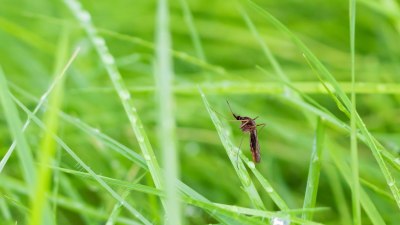How to Avoid Mosquitoes and Heat While Traveling in the Summer
Learn effective tips to stay cool and mosquito-free during your summer travels.

Summer travel can be a delightful experience, offering a chance to explore new destinations, engage in outdoor activities, and immerse oneself in various cultures. However, with the joys of summer travel come certain challenges, particularly concerning mosquitoes and extreme heat. Mosquitoes, known carriers of diseases such as Zika, West Nile, and dengue fever, can be a significant nuisance, while high temperatures can lead to health problems such as heat exhaustion and heat stroke. This article will provide practical tips on how to avoid mosquitoes and manage heat effectively while traveling during the summer months.
Understanding Mosquito Behavior
Before delving into preventive measures, it's essential to understand why mosquitoes thrive during summer. Warmer temperatures, stagnant water, and increased humidity create the perfect breeding ground for these insects. Mosquitoes are most active during the early morning and late afternoon, making these times crucial for travelers to be extra cautious. Understanding their behavior is the first step towards effective prevention.
Selecting the Right Travel Destination
Choosing the right travel destination can significantly impact your exposure to mosquitoes. Areas with less standing water and a cooler climate tend to have fewer mosquitoes. Consider traveling to places that have a lower risk of mosquito-borne diseases. Before making plans, check travel advisories and local health updates regarding mosquito activity. Additionally, regions with higher altitudes generally have fewer mosquitoes, making them a more pleasant option for summer vacation. Places near the ocean or mountains are usually better choices compared to flat, humid areas.
Timing Your Travel
Timing can play a vital role in enjoying a mosquito-free experience. If possible, plan your trips during months when mosquito populations are lower. In many regions, this would mean avoiding the peak summer months. For example, in tropical or subtropical areas, the rainy season, which tends to increase mosquito populations, can be avoided for a more enjoyable experience. Early morning and late evening are when mosquitoes are most active; thus, scheduling outdoor activities in the mid-morning can help you avoid them.
Preventive Clothing Strategies
Your clothing can act as a barrier against mosquito bites. Wear long-sleeved shirts and long pants made of tightly woven fabrics that are light-colored, as dark colors tend to attract more mosquitoes. Consider treating your clothing with permethrin, an insect repellent designed for fabric. Many outdoor retailers sell pre-treated clothing, providing added protection against pesky bites. Furthermore, consider wearing a hat with a brim to shield your face and neck from mosquitoes. This simple clothing strategy can greatly reduce your risk of being bitten.
Utilizing Insect Repellents
Using insect repellent is one of the most effective methods for avoiding mosquito bites. Look for repellents containing DEET, picaridin, IR3535, or oil of lemon eucalyptus. Apply repellent on exposed skin and reapply according to instructions. Remember to consider the environment around you when choosing a repellent; some formulations are specifically designed to be environmentally friendly. In addition to applying repellent, consider using natural remedies, such as citronella candles or essential oils like lavender or eucalyptus, to deter mosquitoes when relaxing outdoors.
Staying in Mosquito-Free Accommodations
When booking accommodations, proactively seek out mosquito-proof lodgings. Ensure that the windows and doors have screens, and consider opting for hotels or resorts that utilize mosquito control measures such as fogging or using insecticide-treated nets. Check reviews for mentions of mosquito issues, which can help guide your choice of accommodation. If staying in a less controlled environment, such as camping or glamping, set up a tent with a mosquito net to create a safe sleeping enclosure.
Creating a Mosquito-Resistant Outdoor Experience
When enjoying outdoor activities, there are several strategies to employ for a more pleasant experience. Set up camp far away from standing water, where mosquitoes are likely to breed. Create wind by using fans or moving around, as mosquitoes are weak fliers. If you’re sitting outdoors, use citronella candles or mosquito coils to deter them further. Avoid wearing floral patterns, as they can attract mosquitoes, and instead opt for solid, light colors. When possible, stay in shaded areas during the hottest parts of the day, as heat combined with mosquito activity can be uncomfortable.
Hydration Strategies to Combat Heat
While avoiding mosquitoes is crucial, you should also focus on staying cool. Dehydration can set in quickly during summer travel, especially in hotter climates. Always carry water with you and consume fluids regularly. When traveling immediately after flying, hydrate before embarking on outdoor activities to mitigate the effects of the altitude and heat. Aim to drink at least half a gallon of water daily; however, increase your fluid intake if engaging in physical activities or spending long periods in the sun.
Smart Food Choices
Your diet during summer travel can also impact how your body manages heat. Eat light and nutritious meals, focusing on fresh fruits and vegetables, which help keep your body hydrated. Foods high in water content, such as cucumbers, watermelons, and oranges, are excellent choices. Moreover, avoid heavy meals that can cause more body heat production, opting instead for smaller, balanced meals throughout the day.
Timing Outdoor Activities
Plan outdoor activities during the cooler parts of the day, such as early morning or late afternoon. During the midday sun, take advantage of shaded areas or indoor activities to prevent overheating. Scheduling walks and excursions in the cooler hours not only minimizes mosquito encounters but also protects you from the heat. If you're hiking, keep your group moving to avoid prolonged breaks in high-temperature areas.
Resting and Recovery
Your body needs to recover from heat and exertion. Prioritize rest during your summer camping or travel trip. Ensuring you have downtime will help your body regulate body temperature and improve energy levels. Find air-conditioned spaces when possible or create shaded areas. If feeling overheated, lay down and elevate your feet to promote circulation and quick recovery.
Portable Cooling Solutions
Consider investing in portable cooling solutions, such as handheld fans or cooling towels that can be dampened to facilitate cooling. Many travelers also opt for personal cooling devices, which use evaporative coolers to provide refreshing air. These gadgets are perfect for days spent outside, whether at a beach, park, or natural retreat.
Staying Informed on Local Mosquito Activity
Stay updated on local mosquito activity throughout your travel. Many regions have mosquito forecasting available through health departments or tourist boards. Social media platforms can also provide real-time updates about mosquito activity. This information can help inform your plans and precautions, allowing you to navigate your trip more effectively.
Emergency Preparedness
Prepare for mosquito bites by carrying a small first aid kit that includes antihistamines for allergic reactions and hydrocortisone creams for itchiness from bites. If you develop symptoms associated with mosquito-borne diseases, such as fever or rash, seek medical attention promptly. Knowing the location of nearby medical facilities before your trip can help in case of an emergency. Ensuring you have contingency plans will make your trip enjoyable rather than stressful.
Traveling during the summer can present challenges with mosquitoes and heat, but it is indeed possible to enjoy a memorable experience with the right precautions in place. By considering your travel destination, timing your activities, wearing protective clothing, using insect repellents, and staying hydrated, you can minimize discomfort caused by these summer nuisances. Educating yourself on local mosquito behavior and being prepared will ensure a safer, more enjoyable travel adventure. Implementing these tips will not only enhance your experiences this summer but may also lead to healthier travel habits in the years to come.











